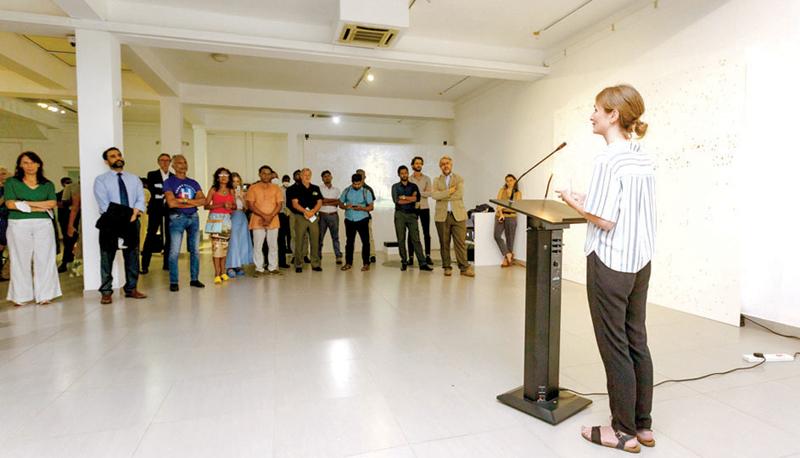
The exhibition project ‘Critical Zones’ invites visitors to engage with the critical situation of the Earth in a novel and diverse way and to explore new modes of coexistence between all forms of life. ‘Critical Zones’ was conceived and first exhibited at ZKM | Centre for Art and Media Karlsruhe and is based on a concept by Bruno Latour and Peter Weibel.
In collaboration with the Goethe-Institute in South Asia, it will travel through India and Sri Lanka in 2022 and 2023. ‘Critical Zones. In Search of a Common Ground’, shows a selection of the artistic positions exhibited at ZKM | Centre for Art and Media Karlsruhe and is complemented by further works from Indian and Sri Lankan.
Mira Hirtz and Daria Mille are the curators of the travelling exhibition that will be on view from November 11-27, 2022 at J.D.A. Perera Gallery in Colombo. The exhibition will be accompanied by a vast activation program consisting of workshops, film screenings and discussion formats.
What is a Critical Zone?
 You are entering a Critical Zone! It is a notion invented by Earth scientists to bring together many different disciplines that have not collaborated sufficiently in the past.
You are entering a Critical Zone! It is a notion invented by Earth scientists to bring together many different disciplines that have not collaborated sufficiently in the past.
Whether you study water, soil, plants, rocks, weather, or animal life, all of those phenomena are confined to a very thin domain when compared to the whole of planet Earth, as viewed from outer space. The Critical Zone is just a few kilometers thick. It is the only region of the Earth that has been transformed by life over many eons.
It is also the only part of the world that you have any chance to experience directly with your senses. Although human activity is barely visible at the planetary scale–not to mention the scale of the universe–it is hugely disruptive at the scale of this thin, fragile, and highly complex Critical Zone.
This is why we need to learn how it behaves just as much as we need to know how our body functions.
And yet, although we have a vast number of tools and instruments to monitor our bodily health, we don’t have many to monitor the health of the Critical Zone in which we humans live–as well as all of the life forms on which we depend.
This domain is called “critical” because this tiny part of the Earth on which we are totally dependent has entered into a sort of intensive care. All efforts should be made to sustain its well-being.
Exhibition at J.D.A. Perera Gallery
The exhibition at J.D.A. Perera Gallery has been realised in partnership with the University of Visual and Performing Arts. It is conceived in a way to give the visitors a feeling for this new territory, - Critical Zone, and also to make tangible the entanglements and interdependencies between different entities inhabiting the Critical Zone.
The coming together of scientific knowledge and artistic sensitivity seeks to develop a kind of sensorium to understand our existence as entangled with all life-forms co inhabiting and shaping the Critical Zone. We invite our visitors to take an active part in this endeavour of reorientation within this space, the fragility of which is being uncovered and confirmed every day. A Fieldbook – which is an exhibition brochure – accompanies you, showing one of a multitude of paths you can take and allowing you to take field notes, and describe your position within this dense texture of traces and co dependencies. The task of recomposing a common ground can only be done collectively.
This travelling exhibition was conceived and first exhibited at ZKM | Centre for Artand Media Karlsruhe,Germany(2020 – 2022) based on a concept by Bruno Latour and Peter Weibel. This special combination of thought experiment and exhibition – a “thought exhibition” – was developed by Peter Weibel and Bruno Latour in their previous collaborations at ZKM.
The digital platform of the exhibition can be experienced at critical-zones.zkm.de.
For press inquiries, event listings, and image requests contact: [email protected]@goetheinstitut_srilanka

